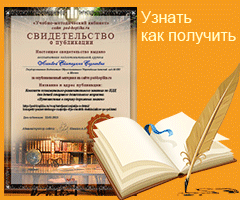Конспект урока английского языка для 10 класса по теме «Подростковые годы. Приносят ли они удачу?»
Конспект урока английского языка для 10 класса по теме «Подростковые годы. Приносят ли они удачу?»
Описание работы: Предлагаю вам разработку урока по теме «Подростковые годы. Приносят ли они удачу?» для учащихся 10 классов. Данный материал будет полезен учителям английского языка и может быть использован в любом классе при прохождении темы ««Подростковые годы. Приносят ли они удачу?». На данном уроке отрабатывается лексика по теме, развитие умений и навыков чтения и слушания с общим охватом содержания.
Тема: TEENAGE YEARS - DO THEY BRING LUCK?
Цели:
1. Тренировка произносительных навыков при декламации стихов.
2. Активизация лексических навыков по теме «Проблемы молодежи».
3. Активизация грамматических навыков (предлоги).
4. Развитие умений и навыков чтения и слушания с общим ох¬ватом содержания.
5. Совершенствование речевых навыков и навыков письма.
Stages
I. Introduction.The objectives of the lesson.
II. Warming-up activities.
Pupils answer the following questions:
1) Do teenage years bring luck?
2) Do you see only problems in growing up?
3) Do you find the ways to cope with them?
4) Will the life without problems be better?
5) Do you think that people can live without problems?
Teacher. Problem is the result of the activity of human mind, only a Simpleton can have no problems and be happy with eve¬rything. Nothing will come of nothing. And of course, problems are inevitable when people do something. I think that without problems our life will be very boring. Moreover, when people start to cope with different ^problems they become stronger and more experienced. They harden like steel while overcoming problems. And what is you opinion?
Pupils exchange their opinions.
III. Phonetic activities.
1. Ex. 2, p. 126 (Student's book).
Teacher. While some teens see only problems in growing up, try to find the ways to cope with them. These two poems are from the "Just 17" magazine. What problems do the authors write about?
Why?
Why is nothing ever easy?
Why are some boys so very sleazy?
Why can't I have that brand new dress?
Why am I under so much stress?
Why don't my parents ever believe me?
Why can't they ever see ...
Why do I feel so often unhappy?
Why do they always wish I was still in a nappy
Why does my face like a block of lard?
Why are all these years really hard?
There's a reason for all these problems and tears
I'm going through my Teenage years!
(by a frustrated teenager)
(Scarborough)
ENJOY YOUR TEENS!
Growing up, doesn't it just suck?
It seems to be full of constant bad luck.
Zits, bad hair days and putting on weight,
So many reasons for your self-bate.
But hey, you are alive, you are unique, you are so cool,
Why do you always feel such a fool?
Be true to yourself, forget all your faults,
And you'll soon be thinking much happier thoughts.
Live life to the max and paint your town red,
Who care what people think and what they have said?
Don't let them win and make you feel bad,
Cause people like that are really quite sad.
So, enjoy your teens and have some fun
Your life has only just begun!
(Lauren Romford)
Pupils answer the question given before reading.
Example:
PI: The author of the 1st poem sees only problems in her life: the boys are sleazy, her parents don't believe her she can't have a brand new dress. But she doesn't see that she has attentive parents, that she can go to school.
P2: I like the second poem. I like these words: "Live life to the max and paint your town red!". I agree with the author that "you are alive, you are unique, you are so cool!". Teenagers should enjoy their teens and have some fun!
IV. Lexical activities. Ex. 1, p. 124.
Translate into Russian.
Keys:
1) to worry about – беспокоиться о чем-то;
2) to become a scary place - .становиться опасным местом;
3) teen pregnancy – беременность подростков;
4) to reach the age of 16 – достигнуть возраста 16 лет;
5) to focus more attention on something – концентрировать больше внимания на чем-либо;
6) to be hard enough – являться достаточно сложным;
7) a chore / char – обязанность, домашняя работа;
8) to hang out with – слоняться;
9) to put some pressure – оказывать давление;
10) a bunch of friends – группа друзей.
Pupils can do this exercise orally or in written form.
V. Grammar activities. Prepositions.
I. Ex.1, p. 93 (AB).
Teacher. Fill in the prepositions.
Key:
1) to worry (about)
2) to turn (to)
3) to have an experience (with)
4) to be combined (with)
5) decide (for) yourself
6) to focus attention (on)
7) to go out (on) weekends
8) to be hard enough (in) itself
9) to deal (with)
10) to hang (about)
11) to be conscious (of)
2. Ex. 6, p. 80.
Teacher. Fill in the prepositions for, with, on, or of.
1)1 don't agree __ you that children's rights are always kept.
2) The Convention is the document __ which Governments' work together __ the children's problems.
3) I met Tom __ the way to school and we walked together.
4) He can't approve __ the fact what made us behave like that.
5) We should get important information ___ the subject.
6) They don't know the result of the exam __ the time being.
7) All children should have the right __ education and health care.
Key: l)with;
5) on;
2) with, on;
6) for;
3) on;
7) to.
4) of;
Pupils do these exercises "in written form.
VI. Reading/listening (for the main idea).
Ex. 1, p. 124 (Student's book).
1. Pre-reading.
Teacher. In the early 90s British television had a series of discus¬sions on the problems of teenagers in a programme called "Crosstalk". Young people shared their opinions on what it means to be young. Read these opinions and answer the questions:
Which of these teenagers thinks that being young
- brings a lot of serious problems?
- allows you to do exciting and wonderful things?
- is a kind of duty and makes you feel responsible for what you do?
2. Reading (skimming).
Pupils rapidly look through the text in order to get a general idea of what the text is about.
3. Post-reading activities.
1) Pupils answer the questions:
PI: John thinks that teenage years bring a lot of serious problems (violence, teen pregnancy, AIDS).
P2: Estelle thinks that being a teenager isn't fun. It's a duty and makes you feel responsible for what you do!
P3: Bar thinks that being a teenager is great fun. Being a teenager al¬lows you to do exciting and wonderful things!
2) Ex. 1(9), p. 126.
Teacher. Thank you for your answers. And whose attitude to¬wards life appeals to you most?
P4: Estelle thinks that being a teenager is a duty. You have to go to school and your parents want you to get good grades. I agree that it is hard enough in itself. And besides, you have to deal with your own problems too.
(Strong pupils listen to the text without reading.)
VII. Speaking (monologue speech).
Ex. 2(8), p. 128 (Student's book).
Teacher. What does growing up mean to you? Share your opin¬ion with your classmates.
Pupils answer this question according to this chart:
Being a teenager is …
very difficult / scary dangerous / hard / . . .
boring / a chore / serious / not easy / . . .
great / fun / exciting wonderful / . . .
It seems as if/ that . . . I'm sure that ... I feel that . . .
I (don't) think that ... My view is that . . . I feel (also) that . . .
It's true that ... But I can't agree that What's more...
Example:
PI: To my mind, being a teenager is exciting and wonderful. It's true that there are some problems, such as: zits, putting on weight. But I can't agree that we have no fun at all. We usually have fun just being around each other. We usually talk about humorous things. What's more, my friends and I try to help each other if we can.
P2: In my opinion, being a teenager is very difficult, dangerous and hard. The world is becoming a very scary place. I'm sure that almost every teenager will at one time or another have an experience with drugs, alcohol or sex, etc.
Pupils share their opinions with their classmates and use the models given in the chart.
VIII. The conclusion of the lesson.
Homework: ex. 3(1, 2), p. 129 (Student's book). Do the project "The way teenagers live".
Рекомендуем посмотреть:
 Мастер-класс. Рождественская книжка на уроке английского языка
Мастер-класс. Рождественская книжка на уроке английского языка
 Конспект урока английского языка в 7 классе «Мои летние каникулы»
Конспект урока английского языка в 7 классе «Мои летние каникулы»
 План-конспект урока английского языка по теме: «Праздники в моей стране» для 6 класса
План-конспект урока английского языка по теме: «Праздники в моей стране» для 6 класса
 Welcome to Annovka!
Welcome to Annovka!
Похожие статьи:
Конспект урока по английскому языку для 5 класса по теме «Времена года»
Информационные технологии на уроках английского языка
Внеклассное мероприятие по английскому языку на тему: Хэллоуин, 5 класс
Конспект урока английского языка в 5 классе по теме: Праздники
Конспект интегрированного урока «Английский язык и физика» в 10 классе
← Конспект урока английского языка в 6 классе по теме: День Благодарения | Конспект урока английского языка для 9 класса по теме «Средства массовой информации» →
|
|
+3↑ Голосов: 3 |
Нет комментариев. Ваш будет первым!



